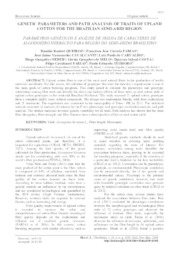Genetic parameters and path analysis of traits of upland cotton for the brazilian Semi-Arid region.
Genetic parameters and path analysis of traits of upland cotton for the brazilian Semi-Arid region.
Autoria: QUEIROZ, D. R.; FARIAS, F. J. C.; CAVALCANTI, J. J. V.; CARVALHO, L. P. de; NEDER, D. G.; MELO, G. G. de; COSTA, D. S.; FARIAS, F. C.; TEODORO, P. E.
Resumo: Upland cotton fiber is one of the most used natural fibers in the production of textile materials worldwide. For this reason, the selection of genotypes that meet the industry?s requirements is one of the main goals of cotton breeding programs. This study aimed to estimate the phenotypic and genotypic correlations among fiber traits and identify the direct and indirect effects of these traits on seed cotton yield of upland cotton genotypes in the semi-arid Brazilian Northeast. This study assessed 21 upland cotton genotypes from a complete diallel cross without reciprocals. The design was randomized blocks, with three replications and 21 treatments. The experiment was conducted in the municipality of Patos - PB, in 2015. The statistical analysis consisted of analysis of variance by the F test, phenotypic and genotypic correlation analysis, and path analysis. The studied materials revealed genetic variability for all traits. Path analysis has shown that the traits fiber elongation, fiber strength, and fiber fineness have a direct positive effect on seed cotton yield.
Ano de publicação: 2019
Tipo de publicação: Artigo de periódico
Unidade: Embrapa Algodão
Palavras-chave: Algodão, Cotton, Fiber length, Fiber quality, Gossypium Hirsutum, Micronaire, Yields
Observações
1 - Por padrão são exibidas publicações dos últimos 20 anos. Para encontrar publicações mais antigas, configure o filtro ano de publicação, colocando o ano a partir do qual você deseja encontrar publicações. O filtro está na coluna da esquerda na busca acima.
2 - Para ler algumas publicações da Embrapa (apenas as que estão em formato ePub), é necessário ter, no celular ou computador, um desses softwares gratuitos. Sistemas Android: Google Play Livros; IOS: iBooks; Windows e Linux: software Calibre.
Acesse outras publicações
Acesse a Base de Dados da Pesquisa Agropecuária (BDPA) para consultar o acervo completo das bibliotecas da Embrapa.

